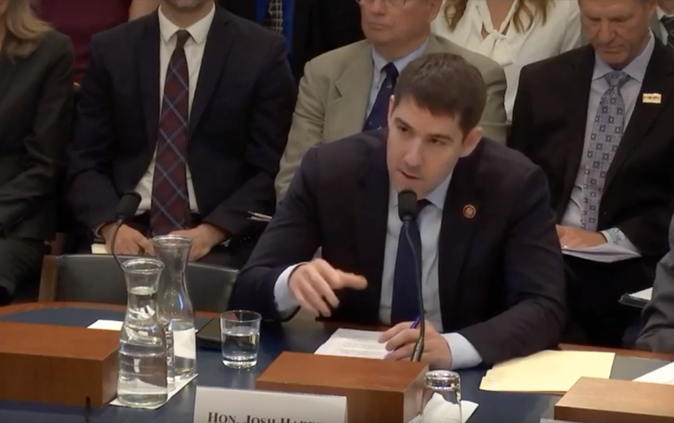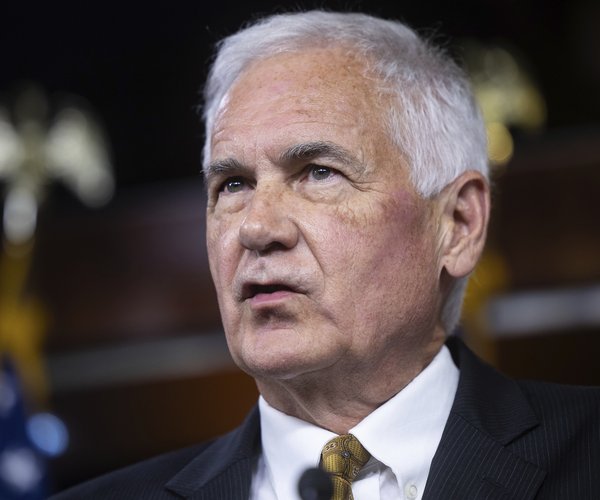More funding to increase water storage, spur innovation in water technologies and make long-overdue investments in the region’s aging water infrastructure could soon be headed to the Central Valley courtesy of Congressman Josh Harder’s SAVE Water Resources Act, which on Thursday took its first step toward becoming law at a congressional subcommittee hearing.
Harder pushed for the passage of HR 2473, or the Securing Access for the Central Valley and Enhancing (SAVE) Water Resources Act, during his testimony in the U.S. House of Representative’s Water, Oceans and Wildlife Subcommittee — his first chance to advocate for the bill in front of his congressional colleagues and, he said, a rarity for a freshman congressman who only introduced the bill on May 2.
“I think the whole process has moved much faster than I even expected. Generally, as a new member of Congress, you don’t necessarily get the entire institution’s attention on your top policy priority very quickly,” Harder told the Journal. “People say, ‘Wait ten years, and we’ll maybe then consider what you think you should be doing.’ I think it’s actually fantastic news that it’s happening so quickly and that we’re even getting a hearing just a month or two after [introducing the bill].”
The legislation, which has bipartisan support, will create cutting-edge programs to grow and sustain the region’s water supply by improving storage capacity, supporting key new technological innovations for drought resistance and groundwater management and establishing responsible levels of federal funding to invest in water future.
“Water may not be the top of mind for a lot of folks here in Washington, but in my home in California’s Central Valley we think about it every day,” Harder told the subcommittee, pointing out that although the state’s drought officially ended in March, rainfall in California can vary from year to year. “Because of that variable rainfall, we’re locked into boom and bust cycles, and federal water policy hasn’t been designed to manage the extremes of a state like California.”
Harder summarized some of the SAVE Water Resources Act’s main components for the subcommittee, such as its potential to help the state prepare for the next “bust” water year as well as its intention to ensure clean drinking water for Valley residents.
The bill would require the Bureau of Reclamation to fast-track feasibility studies for four specific storage projects in the Central Valley, including Sites Reservoir, Del Puerto Canyon Reservoir, Los Vaqueros and San Luis Reservoirs, and provides $100 million in storage funding. The bill also leverages federal resources to identify prime locations for groundwater storage and recharge in California and across the Western United States.
Del Puerto Water District General Manager Anthea Hansen traveled to Washington, D.C., to testify in favor of the SAVE Water Resources Act, which would greatly benefit her district through support of the proposed Del Puerto Canyon Reservoir just west of Patterson. The reservoir is much-needed, she explained, after years of drought that left farmers in her area with a zero percent water allocation in 2014 and 2015, followed by just a five percent supply in 2016.
Even now, with a statewide snowpack exceeding 20 percent of average, South-of-Delta Agricultural Water Service Contractors only have an allocation of 70 percent, she said.
“If it were its own country, California would boast the world’s fifth-largest economy, yet it is unable to provide water reliability to a region that produces more than two thirds of its fruits and nuts and over 50 percent of the nation’s vegetables. This is unacceptable,” Hansen told the subcommittee. “We know what must be done to confront this challenge. The solutions require political will to accomplish, as well as a coalition of water and resource managers and their political leaders who are willing to move past the historic water wars to implement the solutions.”
The SAVE Water Resources Act does just that, with Harder announcing the bill along the Tuolumne River in April alongside organizations who likely haven’t agreed on much before, including representatives from Stanislaus County’s Sierra Club and Farm Bureau.
“There is no one action to make up for all of the years that solutions have failed to improve not only our situation, but the situation for the environment as well,” Hansen said. “California has been miserably lacking in infrastructure investment, and HR 2473 takes an all-of-the-above approach to our water challenges, ensuring investment in new infrastructure including storage, water recycling, water use efficiency projects, and encourages the development of 21st century technologies to grow our water supply.”
In order to incentivize private sector development of new, cutting-edge water developments, the bill will create an “X-Prize” program, authorizing $2 million per year administered by the Department of the Interior. In addition, the bill invests in water reuse and recycling by increasing funding for WaterSMART programs from $50 million to $500 million and extending the program’s authorization.
The SAVE Water Resources Act also invests millions in the Valley’s aging water infrastructure by establishing a water infrastructure and drought solutions fund to provide $300 million for water surface and groundwater storage, water reclamation and reuse, and WaterSMART program projects. An innovative financing program included in the bill would provide low-interest federal loans to fund local water infrastructure projects, and it will also reauthorize the Rural Water Supply Act, which requires the Bureau of Reclamation to work with rural communities to improve access to safe and clean sources of drinking water.
Rep. Jim Costa, who represents California’s 16th Congressional District including Hilmar, Los Banos and Merced, serves on the Water, Oceans and Wildlife Subcommittee and shared his support of the bill during Thursday’s hearing.
“This is an important piece of water legislation that provides additional tools in our water toolbox to provide solutions to sustain California water resources,” Costa said. “It’s the old adage where if you go to a bank and you make withdrawals and you don’t make any deposits; you can only do that for so long. We understand the critical need of the overdraft of our communities…there are many, many good reasons to support HR 2473.”
The SAVE Water Resources Act will be considered, debated and possibly modified by committee before possibly being sent to the chamber as a whole for a vote.
“[HR 2473] has broken the mold in how we think about water…all we’re trying to do in this bill is say, ‘Are there some commonsense elements most of us can agree on to make sure that we’re actually getting some progress?’” Harder told the subcommittee. “We can’t afford partisanship or ideological warfare in these discussions because of the importance of what we’re talking about: the water we drink, the food we eat.”
District 10 constituents will have the opportunity to ask Harder questions about the SAVE Water Resources Act and any other issues on their minds on Tuesday, when the congressman hosts a live telephone town hall. Harder will answer questions beginning at 6 p.m., and those who would like to participate can do so by calling 1-844-881-1317 or by signing up at www.harder.house.gov/join-townhalls.





